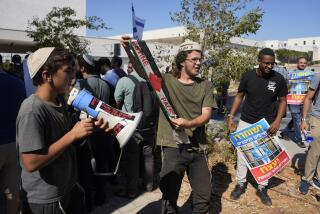Bush’s Words of Contrition Leave Many Iraqis Dubious
- Share via
BAGHDAD — It will take more than a presidential condemnation to restore America’s tattered credibility over the prisoner abuse scandal at the Abu Ghraib detention facility.
That appears to be the consensus here judging from Iraqis’ reaction Thursday to President Bush’s interviews on Arabic television that branded the torture of Iraqi prisoners “abominable.”
Bush was responding to accusations, documented in photographs, that some U.S. soldiers working in the prison abused detainees.
Many Iraqis said they felt that Bush was mouthing words of contrition and that his speech was aimed at Americans, not Iraqis. If he were really sorry, they said, he would rectify problems -- not only at Abu Ghraib, but also throughout Iraq -- to ensure that America delivers on its promises to improve conditions in the wake of Saddam Hussein’s three-decade rule.
“The way Americans and Arabs understood this speech is very different,” said Sheik Fatih Kashif Ghitaa, a Shiite Muslim cleric and a senior staff member to Salama Khafaji, a member of the U.S.-backed Iraqi Governing Council. “Perhaps for Americans it was a very good speech, but in Arabic it did not offer much consolation or solace. We need something that makes people trust America.”
In Baqubah, a city northeast of Baghdad, Sameer Nasir, 40, a merchant who listened to the speech, said he thought it was “propaganda” and “a lie just like the promise that Iraq would be rebuilt after the war.”
“I cannot believe that he is sorry for what has happened to my brothers at Abu Ghraib detention center. They humiliated us from the first day they arrived in our country. How can we trust them? How can we believe them?” he said.
Sameria Ahmed, a 45-year-old pharmacist in Baghdad, offered a minority view of the scandal, noting that Hussein’s regime routinely tortured prisoners.
“I feel sad about what happened to those detainees ... but what happened has happened,” he said. “Let the Iraqis remember what Saddam did to them. He did worst than that, but the problem was that no one was able to show it on television or even to speak about it.”
The skepticism over Bush’s remarks -- and widespread Iraqi disappointment with rebuilding efforts here -- reflected the enormous task facing the United States.
Amal Hadithi, a 37-year-old mother of three, said she did not believe anything Bush said. “Basically, everything we’ve seen from the beginning has been lies,” she said. “If they want to change that image they need to do something very big for the Iraqi people to improve things: They should provide real security quickly, they should create a lot of jobs, and of course they should fix the electricity.
“I don’t think those things should be so difficult for the Americans to do,” she said.
A number of Iraqis said Bush’s comments sounded hollow because he had refrained from offering a straightforward apology -- unlike his subordinates. “Bush never mentioned in his speech that he was sorry for what had happened to the Iraqis. He never shows us any respect,” said Mufieed Saleh, an employee at the Ministry of Education in Baghdad.
Bush did offer an apology Thursday, but that seemed unlikely to make much difference because most Iraqis had already discounted his remarks.
Khafaji, a dentist, shrugged when asked about Bush’s comments. “Of course he had to say that,” she said.
Bush’s remarks could not make up for many Iraqis’ belief that prisoners at Abu Ghraib were being tortured before the scandal broke. “A lot of people think this was organized torture that has been going on for months,” said Mahmoud Othman, a moderate Kurd who is a member of the Governing Council.
There are widespread stories here that a number of women detainees were raped, a charge the U.S. military denies. Khafaji said Americans could repair the damage by allowing the accused U.S. soldiers to be tried under Iraqi law and broadcasting the trials so that people could see justice being done.
“It has to be on television and they have to see that human rights here are present,” she said.
Army Brig. Gen. Mark Kimmitt, the top U.S. military spokesman in Iraq, said the courts-martial would be held in Iraq but no decision had been made on televising the proceedings.
Public shaming of the perpetrators might help restore some dignity to Iraqis who have often felt belittled by their American occupiers.
“We do not need the Americans to pay compensation for what they have done,” said Abed Razaq Aubaidi, a supermarket owner in Baghdad. “What we need more than that is to have back our self-respect. It is very difficult for the Americans to pay this kind of compensation. I do not think they can give us that.”
*
Times staff writer Tracy Wilkinson and researcher Ammar Mohammed in Baghdad and special correspondent Faris Al Mehdawi in Baqubah contributed to this report.
More to Read
Sign up for Essential California
The most important California stories and recommendations in your inbox every morning.
You may occasionally receive promotional content from the Los Angeles Times.











